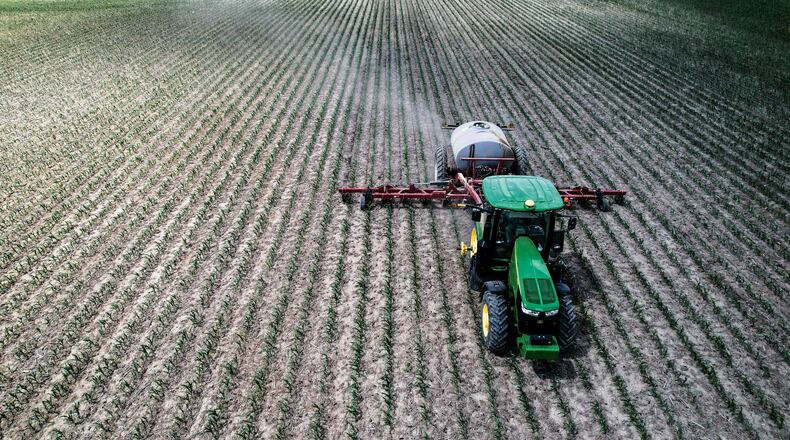The proposed bill, the AFIDA Improvements Act of 2024, would strengthen current law, which requires foreign persons who acquire, dispose of, or hold an interest in U.S. agricultural land to disclose those transactions to the U.S. Department of Agriculture. Brown said the law hasn’t been updated in years and has too many loopholes that allow foreign entities to conceal their identities and hide the true extent of the problem.
He said the loopholes create gaps in data that doesn’t allow the USDA to accurately track farm land purchases by foreign entities. Brown said this is a threat to the economy, food supply, food security and national security due to the lack of this data. He cited a sale in which a Chinese billionaire reportedly became the second largest landowner in the state of Oregon after purchasing 200,000 acres there.
Credit: AP
Credit: AP
“Foreign adversaries, especially China, have bought up prime farmland across this country for decades, but we don’t have a good handle on how much and where because of lax, outdated disclosure laws. It’s a problem for family farmers and rural communities, and it’s a threat to our national security,” Brown said. “This bill is essential to update the rules and shine a light on foreign entities that own agricultural land across the country.”
“We want to deal with this in Ohio before it becomes a big deal,” Brown said.
The legislation builds on Brown’s ongoing work to ban foreign adversaries – like China, Russia, Iran, and North Korea – from getting a foothold in the U.S., particularly near U.S. military installations. Last year Brown’s bill to protect Ohio farmland from China passed the Senate with bipartisan support as part of the Senate’s annual defense bill.
“Ohio Farm Bureau members have had the issue of foreign ownership of farmland on their radar for some time and their concerns have increased over the past few years,” said Adam Sharp, executive vice president of the Ohio Farm Bureau Federation.
Ty Higgins, senior director of communications and media relations for the Ohio Farm Bureau Federation, said 530,000 acres of Ohio farmland is owned by foreign entities or about 2.5% of the state’s farmland. He said 97% of Ohio farms are family farms and agriculture is the state’s top industry.
Higgins said the known top foreign-owned land owners in Ohio are from Germany, 77,000 acres; the Netherlands, 65,000 acres; Canada, 54,000 acres; Italy, 10,000 acres, and the United Kingdom, 6,000 acres. Another 284,000 acres are from other nations around the globe.
According to USDA data from December 2021, foreign investors own approximately 40.8 million acres or 3.1% of U.S. agricultural land. Foreign ownership of U.S. agricultural land increased modestly increased from 2009 to 2015 at an average increase of 0.8 million acres per year. However, since 2017, this number skyrocketed to an annual average of 2.9 million acres. Additionally, between 2010 and 2021, entities or individuals from China increased their ownership of U.S. agricultural land from 13,720 acres to 383,935 acres.
Higgins and Brown both believe the estimates of foreign-owned farmland are undercounted. “If passed, it will help us make better decisions. Food security is national security,” he said.
The state of Ohio recently approved more restrictive rules on foreign ownership of agricultural land, according to Higgins. He said that law requires the Ohio Secretary of State to create and maintain a database of certain people, entities, governments and group on any of the following lists:
- All foreign adversaries as defined by the U.S. Secretary of Commerce;
- All terrorists as defined by the U.S. Secretary of State;
- All countries that have repeatedly provided support for acts of terrorism, as defined by the U.S. Secretary of State; and
- Others whom the federal government has identified as providing direct or indirect financial support for terrorism.
About the Author


